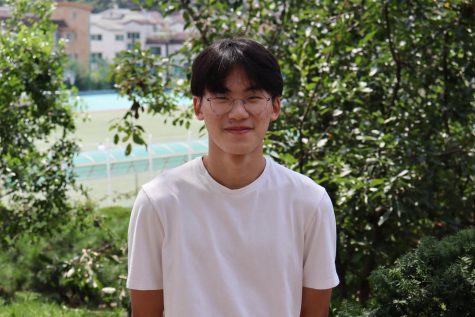Bora Chung interview
On March 20, author Bora Chung visited Seoul International School. Here is a transcript of TTONL’s interview with her.
Q: You’ve studied Polish and Soviet literature and taken inspiration from their authors—what makes their writing stand out? Is it just their magical realism mixed with horror that inspired you, or was it also other aspects of their writing?
A: There was this interwar period after the communist revolution and that’s when everything was allowed in terms of artistic attempts. Even if it was ugly and if you try to express something, you had the freedom. You were not subjected to the censorship of the Russian Empire. They destroyed the Empire and built their own country for the peasants and the common people. So anything that was new compared to the old aristocratic, it was hailed as people’s new art.
Artists were encouraged to try something new and unique, intentionally incomprehensible. There was this period of 10 years and it was just fascinating how human fascination could explode. They have this life that fires off and burns bright, so their life stories are drama in and of itself. It just draws me in and I want to learn more about that energy, the hope for a brighter future and the sense of tragedy.
Q: In other interviews, you’ve mentioned how all of the attention you’ve garnered has felt surreal—do you still feel that way? Has it changed your writing in any way—more confidence, more pressure, something like that?
A: Last year, right after I went to the Booker ceremony, I started to doubt myself and compare every piece of writing with “Cursed Bunny.” And that was a curse. I still have that doubt, and I ask myself: are these people praising me because I am on a list that white people have made?
Q: You’ve often been described as an activist. Korea is a pretty conservative country, and you’ve also mentioned that education is a pretty conservative industry. Where and how then, do you think you became inspired to become an activist?
A: In 2014, on April 16, the ship [Sewol ferry] capsized with 304 people dead. And 100 people or so escaped on their own; not rescued. But when I saw the televised news, the caption said that everyone was rescued.
When I came home, the ship was still shrinking, and the whole thing was televised—we had to witness the kids dying. I couldn’t look at my students in the eyes, and I took to the streets. I try to keep myself sane through protests. I gathered signatures and hollered on the streets, and I met other activists who have been doing that. Even a couple of people from Afghanistan signed the petition. I tried to explain what the petition was about, and this person from Malaysia said “we know” as Malaysian airline MH370 had also disappeared. The solidarity against the discrimination of the disabled helped us a lot. They came to us so I thought it was fair that I went to their protests.
Most recently, I went to Busan, to an anti-nuclear plant protest. I want to be able to look at the future generation in the eye and say “I did something.” At least I marched on the streets or yelled at the culprits. That’s why I go to protests, because I want to be a decent human being.
Q: How do you balance entertainment and thematic messages in your writing? You’ve mentioned that the SF industry is all about entertainment, yet we’ve also found a lot of themes and social commentary in your writing. Could you tell us what your stance is on finding the perfect balance between them?
A: Korean sci-fi tends to reflect more on Korean diversity, people. All we have is our people, technology, and what we can develop. And the use of culture. We tend to reflect more on ourselves.
Q: Do you have any tips for aspiring writers? What’s the best way to improve writing in your opinion?
A: To read and write; there’s no other way. I’ve seen a lot of writers incorporate what they watch, online games, and anything they experience. You can integrate the techniques of anything that hooks you. I was trained to be a literary critic, so I consciously incorporate elements from written materials. But I also watch a whole lot of movies, so I’m sure I’m influenced by those movies.

Woojune is a senior Co-Editor-in-Chief of Tiger Times. He loves to read solutions to difficult math problems (not solve them, though), eat Annie’s Bunny...
